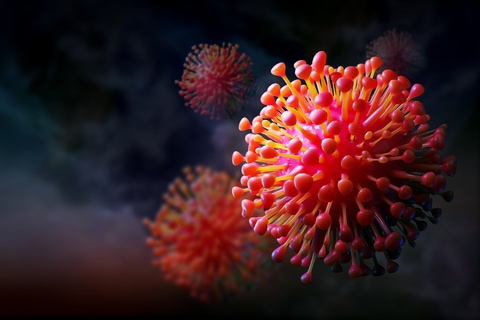How Humidity In Your South Jersey Home Affects Viruses [February 2023]

Conventional wisdom says the summer is safer than winter when it comes to viruses because those particles don’t survive nearly as well when it’s warm out. There’s a good deal of truth to that, but there’s more to the story. And when it comes to staying healthy in your home, humidity plays a role.
Now before we start talking about infections and virus transmissions, we’ll stress that we’re not medical experts.
But, when we get into indoor air quality and how your heating and cooling system affects it, well, that we know a thing or two about that. So, in this article, we’ll cover:
- The effect on viruses
- Common problems in summer
- Controlling the levels in your home
- Managing indoor air quality in warm weather
If you have any questions or need some help with your indoor air quality this summer in South Jersey, call or email us at Broadley’s today.
How Does Humidity Affect Viruses In the Home?
Generally speaking, humidity prevents viruses from traveling and transmitting from person to person. It’s partially why winter, not summer, is flu season: Colder air is drier air, and so viruses and germs circulate more in the winter. More moisture in the summer air means less chance of catching a bug.
There’s no real consensus on why this happens. But there are two fundamental reasons.
First is the effect of the air on the virus itself. The heat, moisture, pH balance, and other factors can make those particles “fall apart,” so they can’t infect you.
The other reason is that the particles can travel further in cold, dry air than in warm, moist air. There’s less resistance in dry air, making transmission a lot easier.
Going by the numbers: when relative humidity is 23 percent or less, more than three-quarters of virus particles in the air remain infectious. But, raise the relative measure to 43 percent or higher, and the infectious particles drop down to 14 percent.
What is the Best Relative Humidity For My Home?
Generally, you want to keep the relative humidity in your home between 40 and 60 percent. That’s the sweet spot in which viruses lose their effectiveness. You don’t run into other low-percentage problems such as dry skin, nose bleeds, and damaged furniture. It’s also low enough to prevent problems from excess moisture.
Before we go any further, let’s clarify the difference between “relative” and “absolute.”
Pretty much everything you’ll read here, in weather reports and so on, talk about the relative measure because it gives you the best description of what you feel.
The absolute number tells you how much water vapor is in the air. You’d see it as “grams of moisture per cubic meter of air” or “g/m3.”
Relative is the percentage you’re much more used to seeing. Without getting into pressure, equilibrium, and some other scientific jargon, we can say that this percentage tells you how much moisture is in the air versus how much moisture the air could hold.
This distinction is important because warm air is naturally more moist than cold air. So, the same absolute humidity would feel much different when it’s cold versus warm out.
Therefore, when you measure for your home, you want the percentage or relative measure, that feels good and keeps you healthy. That way, you can maintain that all year long.
And, since we’re talking about high humidity, the summer, and viruses, let’s talk about what would happen if you let that relative percentage get too high.
High Humidity Problems in South Jersey Homes
When you let the humidity in your South Jersey home get too high — more than 60 percent — you’ll notice problems such as:
- Seasonal Allergy Symptoms
- Feeling Hot and “Sticky”
- Damage to Books, Paint and Furniture
Seasonal Allergy Symptoms
Stuffy noses, coughing, puffy eyes, and more: hay fever is in full effect when the weather’s warm, and there’s a lot of moisture in the air.
The problem is pollen, and it’s made worse by all the moisture in the air. While this stops viruses from traveling, these tiny particles can attach to the water vapor. Then, they’ll hang in the air instead of falling to the ground.
The same goes for dust and other contaminants. And, when they’re up near your mouth and throat, you’ll breathe them in. That’s why people with asthma or other respiratory problems also have trouble breathing when there’s too much moisture.
Feeling Hot and “Sticky”
You’ve heard people say, “It’s not the heat, it’s the humidity.” Well, they’re not wrong … just annoying for recycling the old cliche.
Anyway, the reason you feel hotter when it’s humid is that your body can’t cool itself down. The natural way to do this is by sweating. But, the water vapor acts like a blanket around you.
As a result, the heat coming off your body has nowhere to go. So, it stays close to you. Meanwhile, your sweat can’t evaporate because when the air is already saturated. So, it stays on your body, giving you that sticky feeling.
Damage to Books, Paint and Furniture
This problem is subtler until it’s not: High humidity will start warping wooden furniture, cause the paint to peel, and give your books that wavy look.
Over time, wood and paint absorb that moisture, and it slowly causes water damage. And, unfortunately, there’s not much you can do to reverse it.
Fortunately, it’s easy to control the humidity levels in your home so you can stay healthy without dealing with them.
Controlling the Humidity in Your South Jersey Home
Now that we’ve established why you need to stay in the sweet spot, let’s talk about controlling humidity — particularly in South Jersey. It’s a more significant challenge down in Ocean City, Avalon, Marmora, and other towns near the ocean, where there’s naturally more moisture in the air. But it’s doable.
First off, use your air conditioner in the summer. Part of that cooling process includes dehumidification. In this case, you remove more moisture from a room using a window or wall unit, because they run all the time.
But, of course, they don’t cover as much ground as central air, which has a massive effect on your electric bill. Meanwhile, central air turns on and off a few times every hour. It won’t dehumidify when it’s not on.
That puts a ductless system in the sweet spot: These run almost continuously, but usually in low-power mode. So, you’re getting the dehumidification without the giant utility bill each month.
Dehumidification
Next, invest in a humidistat or smart thermostat that also measures humidity. This way, you can track what’s happening in your home to see if you need to make adjustments.
If it’s consistently too high in the summer, then it’s time to think about a dehumidifier. There are a lot of options, but in many ways, they boil down to two: off-the-shelf models that handle one room, or a whole-home solution that hooks up to your HVAC system.
The one you buy in a hardware store is much cheaper. But, you have to turn it on and off and empty it. And it doesn’t cover a very large area.
Or, you can spend a little more one time and get a model that hooks directly to your central heating and air. That way, you’re using your ducts and vents to remove that excess water vapor. And, it works on its own, just like your heat and central air.
If you’re looking for the best solution for your South Jersey home, call or email us here at Broadley’s. We’ll help you find the perfect setup for your home and your budget.
